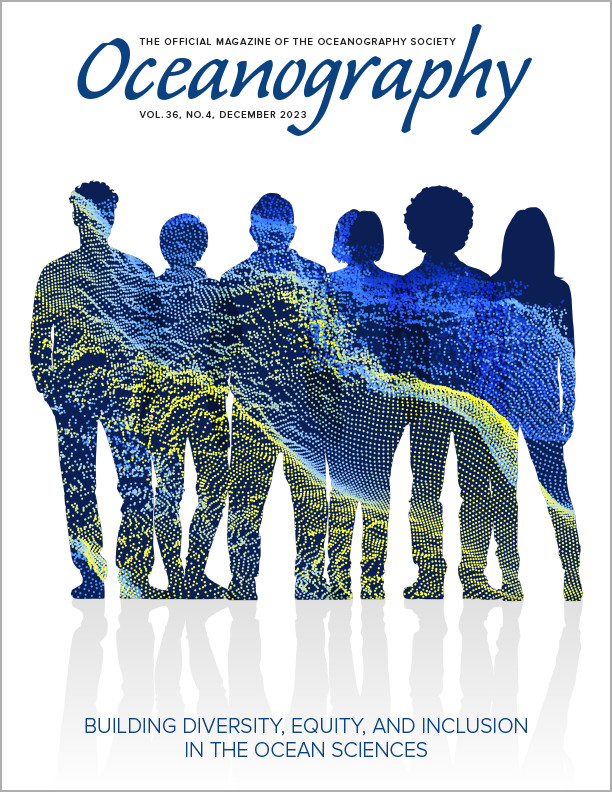Full Text
Understanding the history of how we studied our ocean in the past and how we study it now will help us develop approaches to make future oceanographic knowledge production more diverse, accessible, and inclusive. The motto of the UN Decade of Ocean Science for Sustainable Development (2021–2030) is, “The ocean we need for the future we want” (Singh et al., 2021). The Ocean Decade gives the ocean sciences community an opportunity to change the way it conducts research, to use ocean science to support sustainable development, and to energize the ocean sciences for future generations. With these goals in mind, we developed an introductory level, student-led graduate seminar that builds on the Ocean Decade framework. A research cruise involving seminar participants followed the seminar sessions. Here, we discuss how we conducted the seminar and highlight directions that are needed to energize future generations of ocean leaders and make ocean science more equitable, inclusive, and accessible.
The seminar aimed to recognize that science is historically built on a small subset of privileged voices, and that diverse perspectives are needed to reveal how ongoing structures exclude people from science. The seminar was led by students under the premise that, “No one knows everything; together we know a lot.” We practiced humility through ensuring all voices had equal weight and recognizing that we could all learn from everyone else in the room. We balanced our responsibilities to promote collective learning through active participation with the concept of, “Your Story, Your Choice” (https://aorta.coop). Each person decided which stories to share and which to keep private, so no one was expected to educate others by sharing personal experiences or traumas. We also used facilitation, a discussion method that aims to bring collective knowledge together. While other styles of teaching, leadership, and debate can be more individualistic and based on a single main “knower,” facilitation looks to incorporate the knowledge of all participants. The facilitation technique we used was a round robin: everyone, in turn, had a chance to weigh in on a topic. Different people in a room are more or less likely to speak, be heard, or be interrupted, and facilitation works to address those disparities (https://civiclaboratory.nl).
The seminar was advertised via email to students and researchers across our campus. Students who registered received credit, and scientists who would be participating in the cruise attended the seminar as well. The seminar format was hybrid to allow flexibility for students and invited speakers, although most discussions were in person. The two-hour seminar met weekly for 11 weeks. Participants included fourteen graduate students, one postdoc, one undergraduate, and one professor.
The seminar discussions spanned a wide variety of topics (Table 1) and stimulated meaningful and engaging conversations. Suggested readings were selected by the instructor and the two co-chief scientists, but students could add new readings of interest. The final required readings for each weekly discussion were selected by the facilitators of that week. We talked about colonialism and its legacy in science, such as the impacts of the Morrill Act and dispossession of Indigenous land for use by universities, including the University of California (e.g., Myers, 2021). We also discussed the legacy of military patronage and women’s work in oceanography (e.g., Oreskes, 2002). We framed these discussions with the concept that understanding the past can help us to address current barriers for historically marginalized groups and to promote diversity in science. Additionally, we considered ocean literacy and the importance of respecting different knowledge systems. We spoke about how institutions in the United States and other countries might build capacity and promote just and equal access to knowledge, education, training, and resources in the face of barriers such as prohibitive research costs and disproportionate access to oceanographic resources and technology (Harden-Davis and Snelgrove, 2020).
TABLE 1. Key themes and discussion points to galvanize the international community and early career ocean professionals to design inclusive, diverse, and ethical ocean education and knowledge production efforts. > High res table |
The course culminated in a six-day, student-led research cruise, which offered the ideal opportunity for hands-on experience and consideration of how to make the production and dissemination of oceanographic knowledge more diverse and accessible. Over two-thirds of our science party were students, and we represented seven countries: the United States, Mexico, Ecuador, India, Austria, Malaysia, and China. The cruise was the first time more than half of the science party had participated in a multi-day research expedition. Students conducted various research projects, examining different chemical tracers, aerosols, zooplankton biomass and grazing, microbial diversity and metabolism, and the impact of plastics on the seafloor. They worked in teams during the ship’s transits to design science communication projects inspired by the discussions we had during the seminar. The projects were aimed at sharing the process of oceanographic knowledge acquisition with a broad audience, and they included filming interviews about the career paths of the ship’s crew members, writing an article for children about doing science at sea, and creating a photo essay to be shared with the public (https://scripps.ucsd.edu/news/ocean-classroom).
Based on our experience through this course and facilitated discussions, we suggest three directions to make knowledge production more accessible and equitable (Figure 1). First, know your histories and their legacies in how we conduct science, and practice deep listening and building trust. Second, decolonize access and promote building capacity and equitable access to technology, data, and funding. Finally, develop ethical ocean science in inclusive terms and promote a culture of change to establish diverse research teams and dismantle biases. We believe that exposing students, researchers, and instructors to these topics can help to develop meaningful discussions that address biases and barriers, make the dissemination and production of oceanographic knowledge more inclusive, and energize future generations of ocean leaders in more equitable and inclusive ways.
|
|



